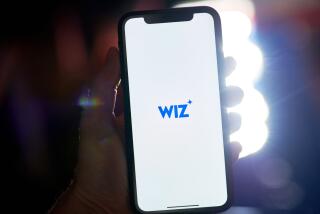EchoStar’s Purchase of DirecTV in Trouble
- Share via
Executives at DirecTV are contemplating a management-led buyout, sources said Tuesday, as government regulators move closer to rejecting EchoStar Communications Corp.’s proposed $15-billion purchase of satellite rival DirecTV and its parent, Hughes Electronics Corp.
If regulators reject the merger, some DirecTV executives believe a buyout of the company would be a better alternative to selling the leading satellite TV provider to Rupert Murdoch’s entertainment giant News Corp., which lost to EchoStar in a bidding war for Hughes and DirecTV in October.
Hughes’ parent, General Motors Corp., originally put the El Segundo-based subsidiary up for sale because it needed cash from its controlling 30% stake in the publicly traded company to fund automotive operations. “Our priority is getting the merger done. That’s the best possible outcome for all parties,” said Hughes spokesman George Jamison.
However, sources say the auto giant has grown impatient after trying for more than two years to sell Hughes, and it would not relish further delays and another lengthy regulatory review that a new offer from News Corp. could bring.
Last year EchoStar agreed to buy Hughes in a stock and cash deal worth about $26 billion. Because of a steep decline in EchoStar’s stock, the deal is now worth about $15 billion. But Hughes’ market value is about $11 billion, with GM’s stake worth about $3.3 billion. In today’s weakened stock market, it is uncertain whether GM could demand from another buyer the 25% premium still built into the EchoStar offer, sources said.
Since October, EchoStar and DirecTV have been awaiting federal approval in the face of harsh criticism of the deal on antitrust grounds. A marriage of the nation’s only two satellite TV providers would create a monopoly serving 18.2 million subscribers, or one-fifth of U.S. homes.
Some analysts say an investor or buyout firm may be interested in acquiring GM’s stake in Hughes given the improvements in DirecTV’s financial performance since last fall.
In recent months DirecTV President Roxanne Austin has told her top management team several times that the company’s improved performance gives Hughes alternatives that were not conceivable last fall, such as a management buyout, if the EchoStar deal is rejected, sources said. Since Austin was installed as president last year, DirecTV’s costs have dropped and revenue and cash flow have improved. But analysts also question whether a Hughes buyout offer built heavily around debt would be appealing to Wall Street.
EchoStar CEO Charles Ergen is scheduled to appear before the Justice Department staff late next week. Ergen is the last executive from either company to be deposed before a scheduled Oct. 8 meeting at the Justice Department with the two companies. Executives expect to learn that day whether the agency will approve the EchoStar-DirecTV merger, and any remaining conditions.
Staff attorneys at the U.S. Justice Department are leaning toward recommending that the EchoStar-DirecTV merger be rejected on antitrust grounds, according to sources familiar with the regulatory review. Assistant U.S. Atty. Charles James, who will make the final decision, acknowledged at a hearing last week that the merger would create a pay-television monopoly in many rural markets that don’t receive cable.
Meanwhile, Ergen plans to personally lobby Federal Communications Commission Chairman Michael K. Powell today in an effort to salvage the deal. The FCC’s self-imposed deadline to accept or reject the deal expires in early November.
A new wild card in the yearlong review process is Cablevision Systems Corp., the Long Island, N.Y.-based company that is the nation’s seventh-largest cable TV operator.
Cablevision plans to launch its first satellite in March and begin selling pay-TV service nationwide next summer. But Cablevision contends that it could be an even more viable satellite TV competitor under an offer it proposed to regulators this month to buy additional satellite capacity from EchoStar. Cablevision would like the government to impose such a sale as a condition of any merger.
The Cablevision offer is sketchy, and critics question the last-minute offer, given the company’s weak financial condition. But government regulators have asked for more details and plan to give the offer careful consideration, sources say.
As a result, a scheduled meeting next week between James and several state attorneys general who opposed the EchoStar-DirecTV deal has been postponed until early next month, one source said.
New York, Connecticut and Missouri are among those states that have hinted that they may sue to block the merger, even if federal regulators approve it.
“My prediction is that there will be at least a core group [of states] leaning toward taking some action,” Connecticut Atty. Gen. Richard Blumenthal said.
Officials at DirecTV and EchoStar have been putting up a united front, expressing confidence that the deal--which is still subject to shareholder review--will be approved.
Investors are less certain. Shares in Hughes Electronics, a GM tracking stock, fell 41 cents Tuesday to $8.40 on the New York Stock Exchange. EchoStar shares fell $1.30 to $16.10 on Nasdaq.
Even if the deal is rejected by regulators, EchoStar must pay Hughes a $600-million breakup fee under terms of the merger agreement. The agreement also requires EchoStar to purchase Hughes’ PanAmSat, a satellite company, for about $2.7 billion.
But TV industry executives who know Ergen doubt that he will exit quietly. EchoStar probably will sue the government to save the merger, sources said. He also is expected to fight GM in court over the breakup fee and the purchase of PanAmSat, sources said.
Hofmeister reported from Los Angeles, Sanders reported from Washington.
More to Read
The biggest entertainment stories
Get our big stories about Hollywood, film, television, music, arts, culture and more right in your inbox as soon as they publish.
You may occasionally receive promotional content from the Los Angeles Times.










